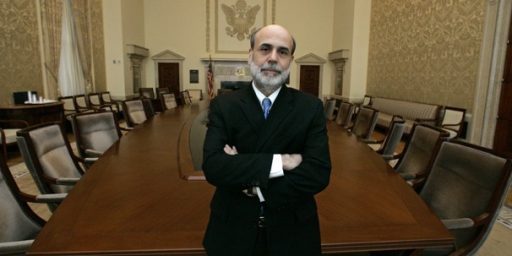Congress Silent on Federal Pay Raise, Thus Allowing One
We federal civil servants are apparently in for a backdoor pay raise.
We federal civil servants are apparently in for a backdoor pay raise.
Government Executive (“Bill Allowing a 1 Percent Pay Raises Clears House Committee“):
The full House Appropriations Committee on Wednesday approved a bill that would allow civilian federal employees to receive a 1 percent pay raise next year.
The committee passed the fiscal 2015 Financial Services and General Government spending bill 28-21. The measure includes a total of $21.3 billion in funding for the judiciary, Treasury Department, Small Business Administration, Securities and Exchange Commission, and other small agencies. It does not specifically set aside money for a pay raise, but it also doesn’t prohibit one, meaning President Obama’s proposed 1 percent boost can take effect.
The Senate version of that appropriations bill also is silent on the raise, and none of the other appropriations bills passed so far prohibit a pay raise.
If there is no specific legislative language that provides funds or prohibits an across-the-board pay raise in any bill — either stand-alone or omnibus legislation – then the president has the authority to determine a pay raise based on the Employment Cost Index. Obama recommended the 1 percent hike in his fiscal 2015 budget.
Given that there was a three year federal civilian wage freeze followed by a below-cost-of-living raise last year, a below-cost-of-living raise this year isn’t much to get excited about. And we’ll fall even further behind our uniformed military counterparts, who are slated for a 1.5 percent hike.
It’s been my longstanding view that federal cost of living adjustments should apply across the board; everyone from Marine corporals to retired octogenarians on Social Security should get the same raise. To the extent that Congress believes pay is out of whack—maybe those who jump out of airplanes in the dark behind enemy lines aren’t being paid enough compared to those pooping in the halls of the EPA—they should align base and incentive pays accordingly as a separate act.
I’m writing, though, not to complain about my pay (I’ve been on the job less than a year, joining in the midst of sequestration and weeks before the government shutdown, so knew what I was signing up for) but rather to point to the oddity of the mechanism by which it’s being decided. It seems obvious to me from a reading of the Constitution that Congress, not the president, should set the rate of pay for federal employees. Given that the politics make it difficult for them to approve raises for what the public believes are overpaid, underperforming—if not completely unnecessary—bureaucrats, especially during weak economic times, it’s reasonable enough to have a standing law that raises will track the Consumer Price Index or other measure of inflation, whether directly or with an offset, absent separate Congressional action. But it strikes me as bizarre to instead have the default position that the President can do whatever he wants unless Congress votes otherwise.
Note that these are the same people who get outraged when the president operates as though Congress were an afterthought.







Little else need be said.
Well, I can stand a raise, since Border Patrol pay was cut 25% across the board for most of us.
Likewise, nothing to get worked up about if one is a taxpayer.
I agree with you about how odd the setup is. It would make a lot of sense to have increases indexed to inflation (insert argument over which measure of inflation HERE) and require congressional action in order to provide more or less. I can’t see the GOP agreeing to such a setup, though. Maybe the Dems wouldn’t like it either, but I don’t see any clear ideological reason for them not to (maybe that it undercuts the ability of public employee unions to do their thing?). Anyway, agree that the current system is a hot mess.
Even over a 1% adjustment. They cannot conduct routine business. {{{ugh}}}
Let me make sure I understand this. If the individual agencies’ budgets were based on the old pay rate, then the only way to fund this raise would be to reduce overall federal employment (e.g. by attrition during the year) or steal funds from capital acquisitions, maintenance, and other non-salary expenses. Is that right?
@DrDaveT: That’s my understanding, yes. POTUS is being given wide latitude over the funds.
@James Joyner:
Again, I want to make sure I understand what you mean by that. Do you mean that the President can overrule the funding amounts ratified by Congress in their appropriations/authorization bills, and substitute his own? Or do you mean that those appropriated amounts are fixed by Congress, but the President can authorize reallocating some of it to pay raises?
If the agency top lines are fixed, they would be insane to put any of toward pay raises. They are already underfunded in the current budget for the work they’ve been given…
@DrDaveT: It’s a good question. I’m honestly not sure. The Executive Order from last year references various enabling legislation but not where the money is coming from, since he can’t bust Congressional caps under sequestration.